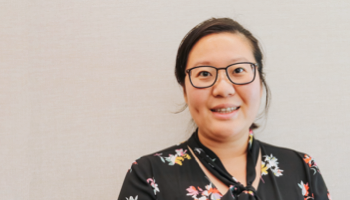HOW CAN WE HELP YOU? Call 1-800-TRY-CHOP
In This Section
Speaking to the Validity of Science: Q&A With Rui Fu, PhD, New Diversity Fellow

The Postdoctoral Research Fellowship for Academic Diversity is one of the many ways the Office of Academic Training and Outreach Programs at the Research Institute is committed to cultivating an inclusive and representative biomedical research workforce. In part two of a Cornerstone Q&A series, we introduce Rui Fu, PhD, a diversity fellow who is working with her mentor, Stephen Leff, PhD, psychologist and co-director of the Violence Prevention Initiative at Children’s Hospital of Philadelphia, and associate professor of Clinical Psychology in the Perelman School of Medicine at the University of Pennsylvania. Read part one here.
Tell us about your background and what compelled you to apply for the Postdoctoral Research Fellowship for Academic Diversity?
I am currently a postdoc fellow working on school bullying prevention projects led by Dr. Stephen Leff. Prior to my postdoc position, I obtained my PhD in the Human Development and Quantitative Methods Division at the University of Pennsylvania.
My interest in diversity in human development and adjustment arose immediately after I started the graduate program at Penn and has become increasingly intensive and extensive in recent years. The systematic training I received in understanding sociocultural and developmental issues and in designing and conducting rigorous scientific research has allowed me to explore the implications of diverse contexts for children’s and adolescents’ social, school, and psychological adjustment and development.
I applied for the Postdoctoral Research Fellowship for Academic Diversity because I wanted to enhance my skills in grant writing and running intervention projects, continue to build my publication record, and establish broader research networks with scholars in diverse fields such as developmental-behavioral pediatrics, public health, and social work, among others. These skills will be critical to better prepare myself for research faculty positions in the future.
What does diversity in research and science mean to you?
To me, diversity speaks to the validity in science. In making choices about what problems to investigate, what populations to study, and what procedures and measures to use, being aware of and respecting diversity helps to ensure research validity.
For example, in one of my studies involving Asian American children, I found that although immigrant children living in adverse circumstances, such as low socioeconomic status and stereotypical prejudice, may display difficulties in social and psychological adjustment, their experiences with diverse social and cultural values and lifestyles might enhance their confidence in expressing strengths during social interaction and performance on tasks. Indeed, exposure to diverse values and experiences seems to serve as a protective factor buffering against maladaptive development. Therefore, we might be less likely to discover these protective factors if assuming the impact of adverse life circumstances is simplistically universal.
What are some research projects that you’re excited about?
My team will soon launch a large-scale intervention program designed to help 4th- and 5th-grade minority girls living in urban environments decrease their use of relational aggression, such as rumor spreading and social exclusion, and physical aggression; improve problem-solving and anger management skills (feeling recognition, use of cooling down strategies); and promote prosocial strategies for dealing with peer conflicts. This program is uniquely designed to meet the needs of the participating schools though active partnerships between the research team and youths, teachers, counselors, and parents. Also, this program utilizes teaching modalities that are fun and culturally diverse, making it easier for students to actively engage with the program content as they learn.
What inspired you to focus on Child and Adolescent Psychiatry? What do you aim to achieve with your research?
It is my hope to pursue a successful academic career, especially in conducting developmental and intervention research with diverse populations of children and families. Based on my scientific work, I aspire to help minority and underprivileged children and adolescents to achieve better social and psychological well-being through promoting diversity in human development and through translating empirical findings to practice and policy.
When you’re not working, do you have a favorite pastime or spot to relax, enjoy a meal, or be active?
I like doing arts and crafts when free, as these activities have been a great stress reliever for me. In particular, I am interested in different types of DIY activities that I could engage in with my tot at home.


